É hora de dar voz aos que querem a paz na Ucrânia; leia o artigo do chanceler Mauro Vieira
Temas de relações internacionais, de política externa e de diplomacia brasileira, com ênfase em políticas econômicas, em viagens, livros e cultura em geral. Um quilombo de resistência intelectual em defesa da racionalidade, da inteligência e das liberdades democráticas.
O que é este blog?
Este blog trata basicamente de ideias, se possível inteligentes, para pessoas inteligentes. Ele também se ocupa de ideias aplicadas à política, em especial à política econômica. Ele constitui uma tentativa de manter um pensamento crítico e independente sobre livros, sobre questões culturais em geral, focando numa discussão bem informada sobre temas de relações internacionais e de política externa do Brasil. Para meus livros e ensaios ver o website: www.pralmeida.org. Para a maior parte de meus textos, ver minha página na plataforma Academia.edu, link: https://itamaraty.academia.edu/PauloRobertodeAlmeida;
Meu Twitter: https://twitter.com/PauloAlmeida53
Facebook: https://www.facebook.com/paulobooks
sexta-feira, 24 de fevereiro de 2023
Artigo do chanceler Mauro Vieira sobre a guerra na Ucrânia
Ukraine: one year of war - Rosalind Mathieson (Bloomberg)
ONE YEAR OF WAR IN UKRAINE
Bloomberg, February 24, 2023
For months, Russian President Vladimir Putin denied he was planning to invade Ukraine. Even as his forces massed on the border in ever-greater numbers, the Kremlin portrayed it as standard exercises.
Just a week before he unleashed his war, Russia was still saying no conflict was coming.

And when he launched his forces in the early hours of Feb. 24, 2022, Putin couldn’t bring himself to use the word “war,” describing it as a mere “special military operation” to support the desires of separatists in Ukraine’s east to be part of Russia. That’s even as his troops and tanks came into Ukraine from the north and marched toward the capital, Kyiv. And as rockets fell on multiple cities across the country.

Despite all the buildup, for many in Ukraine the war came as a shock. Millions jumped in their cars or rushed to railway stations. A year later, many thousands of Ukrainians remain refugees. Thousands of civilians have been killed and driven from their homes by rocket strikes, and the economy is largely kept afloat by outside aid.
But Putin has also failed to achieve his goals. Ukraine has not fallen. President Volodymyr Zelenskiy did not flee; instead, he took his background in show business and became the front-facing cheerleader of his people for the world.
Russia has lost a good slice of the territory it took in the early weeks of fighting. The war is largely bogged down in the east, with both sides running low on weapons and other supplies.
Ukraine’s allies have sent in extraordinary levels of military support. That includes ever-increasingly offensive weapons, with advanced battle tanks the latest to be promised.

And yet the longer that Russia’s forces can hold ground in the east, the harder they will be to dislodge. Ukraine’s allies are strong in their support but as the war drags on, unity may start to fray.
Having cracked down on dissent at home, Putin is having some success in pivoting his rhetoric increasingly to cast Russia as under fundamental attack from the West — particularly the US and European nations.
Big nations like China and India have declined to sign up to the massive sanctions regime on Moscow. Russia’s economy has not collapsed. There are increasing signs that nations in the so-called “Global South” want the war simply to end either way.
The challenge in any war that goes into its second year is sustaining momentum. Time may, unfortunately for Ukraine’s people, end up on Russia’s side. — Rosalind Mathieson
O PT gosta de se enganar com suas próprias mentiras - Editorial Estadão
Governando com o fígado
Editorial O Estado de S.Paulo, 21/02/2023
Eivada de ressentimentos e mentiras, a recente resolução do PT é reflexo do que sente e pensa Lula, que parece se sentir credor do País. Não se governa um país com sede de vingança
O Diretório Nacional do PT aprovou há poucos dias uma resolução eivada de ressentimentos e mentiras, cujo único objetivo parece ser reescrever a história recente do País para lavar a alma da militância depois de uma série de reveses políticos e judiciais sofridos pelo partido. Quem lê aquele documento sai com a nítida impressão de que o Brasil tem uma dívida praticamente impagável com os petistas, sobretudo com a sra. Dilma Rousseff e com o presidente Lula da Silva.
Ora, todos sabemos que Lula da Silva é hoje muito maior do que o PT. Ao longo de mais de quatro décadas, o lulismo se firmou como um movimento político de expressão muito mais relevante que o petismo, se é que, de fato, existe essa distinção. É óbvio, portanto, que o teor da resolução aprovada pelo partido reflete exatamente o que sente e pensa o presidente da República hoje. E isso não é nada bom para o País.
No universo paralelo de Lula e do PT, Dilma Rousseff era a timoneira de um país que ia de vento em popa rumo ao inescapável encontro com seu futuro de paz social e prosperidade econômica até sofrer um “golpe”, em 2016, perpetrado pelas “elites”, pelos “inimigos do povo brasileiro” ou coisa que o valha. Já o partido, nessa visão mendaz da história, teria sido vítima de “falsas denúncias” de corrupção à época dos escândalos do mensalão e do petrolão.
Não é o caso, aqui, de contrapor com uma enormidade de evidências factuais as grosseiras lorotas difundidas pelo PT em sua resolução, até porque seria um trabalho inútil. Petistas fanáticos jamais aceitariam o fato, de resto incontestável, de que o impeachment de Dilma foi conduzido estritamente segundo a Constituição – salvo quando, em seu desfecho, preservou os direitos políticos de Dilma em vez de cassá-los, numa maracutaia típica daqueles tempos esquisitos. Os fiéis da seita lulopetista igualmente ofendem-se quando se demonstram os inúmeros crimes de corrupção passiva, organização criminosa e lavagem de dinheiro cometidos pela patota.
A questão de fundo é menos a resolução do PT – que, afinal, é uma organização privada e pode defender o que bem entender – e mais o que ela representa: os humores de Lula da Silva.
Seja pelo que se depreende do texto da resolução, seja pelos discursos do próprio presidente, que se recusa a descer do palanque mesmo tendo sido eleito para governar no interesse de todos os brasileiros, este terceiro mandato presidencial do petista, o quinto do PT, parece orientado a reparar as “injustiças” que teriam sido cometidas contra o partido e alguns de seus próceres, e não a reconstruir o País e o tecido social após a tragédia que foi o governo de Jair Bolsonaro.
Ao que parece, o triunfo eleitoral de Lula da Silva na difícil eleição presidencial passada, aos olhos dos petistas, tem o condão de autorizar o presidente a privilegiar os interesses particulares do PT e a trair a aspiração maior de muitas forças políticas que o apoiaram no segundo turno da eleição de 2022: a construção de uma frente ampla pela democracia não só para derrotar Bolsonaro, mas também para governar o País.
Se os ressentimentos de Lula da Silva e a sede de vingança que parece animar as lideranças petistas são genuínos ou nada mais que tática para manter a militância mobilizada a despeito de certas decisões impopulares que o governo logo terá de tomar, pouco importa. O fato é que não é assim que se governa um país. Menos ainda um país que precisa tanto se reconciliar e se reunir em torno de consensos mínimos como o Brasil.
O presidente Lula da Silva precisa ser magnânimo e reconhecer a existência de um centro liberal democrático que foi fundamental para sua vitória, por entender que era ele, e não Bolsonaro, a pessoa mais indicada para governar o Brasil pelos próximos quatro anos. Voltar as costas para essas forças políticas é, na prática, aniquilar as chances de reconstrução nacional já no nascedouro.
O rancor nunca foi um bom guia. Do presidente Lula da Silva se espera a grandeza de compreender que, nesta quadra da história do País, é justamente a diversidade que deve prevalecer, não o espírito de corpo.
quinta-feira, 23 de fevereiro de 2023
Número especial da Foreign Affairs sobre um ano de guerra de agressão da Rússia contra a Ucrânia
|
O Congresso americano se intromete no delicado equlíbrio Taiwan-EUA-China - Olivier Knox (WP)
Vai dar muita confusão e mais fervura no ambiente bilateral EUA-China.
|
China committee chair makes secret trip to TaiwanThe Daily 202, The Washington Post, Feb 22, 2023
|
|
Let’s talk about secret overseas travel with important national security dimensions. No, this is not about President Biden’s cloak-and-dagger visit to Ukraine. It’s about Rep. Mike Gallagher’s four-day trip to Taiwan over the long weekend, which he did not publicize before going or draw attention to by talking to reporters once there. And draw attention it would have. The Wisconsin Republican, a counterintelligence officer who did two tours in Iraq as part of a seven-year stretch of active duty in the Marines, chairs the House’s brand new committee on China. My colleague Ellen Nakashima spoke with Gallagher upon his return. She has the scoop on: |
|
A MCCARTHY TRIP? |
The mere fact of the trip is interesting. So is the secrecy. When then-Speaker Nancy Pelosi (D-Calif.) traveled to Taiwan in August, Biden confirmed the trip before it was announced, angering China, and declared the Pentagon opposed it. Both steps made it harder for her to go. |
Pelosi went anyway, becoming the most senior U.S. government official to visit in a quarter century. Once she had left, China fired ballistic missiles near Taiwan and sent warships and fighters near the island to conduct what it called training exercises. Ellen reported this interesting nugget: “Gallagher, well aware of the furor caused by Pelosi’s visit, said he deliberately kept his own visit quiet to have more productive meetings. A senior U.S. defense official made a visit at the same time, which leaked and was front-page news in Taiwan.” Speaker Kevin McCarthy (R-Calif.) is expected to make his own visit to Taiwan this year, though his office has not announced definite plans, much less a timeline. China has warned him not to do it. There’s no reason to think he’ll back down. |
|
“Gallagher said he intends to hold a select committee hearing in Taiwan— hopefully before summer and then report back to McCarthy on its findings. That would better inform the speaker’s plans, and he and Minority Leader Hakeem Jeffries (D-N.Y.) could visit possibly after Taiwan’s next presidential election in early 2024,” Ellen reported. (The most provocative time for a McCarthy visit this year would probably be early March, when China’s National People’s Congress holds its annual session, because it would look like a slap in the face to Chinese leader Xi Jinping.) |
BIPARTISAN SUPPORT |
Gallagher wasn’t the only member of Congress in Taiwan. Huizhong Wu of the Associated Press reported on another delegation, which included Reps. Ro Khanna (D-Calif.), Tony Gonzales (R-Tex.), Jake Auchincloss (D-Mass.) and Jonathan Jackson (D-Ill.) Support for Taiwan has deep, decades-long bipartisan roots. “We need to be moving heaven and earth to arm Taiwan to the teeth to avoid a war,” Gallagher told Ellen. “Nobody knows if and when Xi Jinping wakes up and decides to do this but all the more reason to put in place a denial posture as quickly as possible.” |
Ingressando num novo vórtice do lulopetismo diplomático, com a guerra da Ucrânia - Paulo Roberto de Almeida e William Waack (Estadão)
Por profunda ignorância de qual seja o mundo ao qual o Brasil pertence, ou pela prevalência anacrônica de seus instintos antiamericanos (aprendidos e apreendidos nos seus contatos com seus amigos e financiadores cubanos), Lula e o PT envolvem o Brasil na trama anti-Ocidente manipulada pelas duas grandes autocracias do BRICS, um tremendo erro estratégico da canhestra diplomacia lulopetista, que ainda vai causar muita dor de cabeça à diplomacia profissional do Itamaraty. Estamos ingressando num bolsolavismo diplomático às avessas.
Paulo Roberto de Almeida
Governo Lula não quer entender a natureza do conflito na Ucrânia?
A velha ordem internacional acabou, colocando o Brasil diante de complexas escolhas
William Waack
O Estado de S. Paulo, 22/02/2023
Até aqui o governo Lula não parece ter entendido a natureza do conflito na Ucrânia. Ou pretende não entender.
Não se trata de ação armada fruto de “um equívoco”, como o presidente descreve a invasão deflagrada por Putin. Na sua essência, é parte relevante da contestação da ordem que vigorou desde a 2.ª Guerra Mundial.
A ascensão veloz da China ao papel de desafiadora do “hegemon” (EUA), por si só, já seria o grande fator de contestação. É o que faz clássicos do hiper-realismo duvidarem que NÃO venha a ocorrer grave conflito militar entre as superpotências.
Mas tanto China como Rússia “aceleraram” o processo. Ambas enxergam o Ocidente como uma grandeza em declínio. Especialmente Putin juntou o velho imperialismo russo de mais de dois séculos com seu entendimento da “decadência moral” dos países ocidentais.
O resultado é uma profunda transformação na qual o que parecia garantido – um regime internacional baseado em respeito a regras e integração cada vez maior de comércio e cadeias produtivas, a tal globalização – está recuando na própria substância.
Nesse novo contexto, multilateralismo e “governança” global passaram a ser figuras de retórica, às quais o governo brasileiro parece abraçado. Assim, é difícil imaginar um eixo sul-sul, em oposição a um “norte”, quando se percebe que pelo menos dois integrantes dos Brics estão de um lado no conflito, e não apenas na Ucrânia.
A guerra na Ucrânia não é um episódio isolado, diante do qual vamos é ficar quietinhos, aproveitar as oportunidades, tratar de não ofender ninguém e posar de bom moço repetindo platitudes inúteis sobre “paz” e oferecendo-se para negociar entre beligerantes – o caminho trilhado por Lula até aqui.
São forças históricas de imensa amplitude em ação, e que conduzem países como o Brasil (potência média de influência regional) não propriamente a escolher um “lado”. Mas, sim, a optar por um “mundo”.
A guerra em curso até aqui desmentiu os cálculos estratégicos de China e Rússia, que presumiam sobretudo incapacidade de ação conjunta e coesão por parte do adversário. O campo de batalha da Ucrânia demonstrou não só a atual superioridade tecnológica ocidental, que a autocracia chinesa é capaz de superar. A lição fundamental é a de que sociedades abertas no fundo mudam mais rápido, adaptam-se melhor (a Alemanha abandonou o pacifismo) e têm melhor desempenho na relação entre poder civil e operações militares.
O que se explica pelos valores em torno dos quais essas sociedades se desenvolveram e prosperaram. O Brasil é parte do mundo ocidental.
quarta-feira, 22 de fevereiro de 2023
The day Ukrainian stopped Russian assault to Kyv - BBC
How Russia's 35-mile armoured convoy ended in failure
Stepping outside for his first cigarette of the day, 23-year-old Vladyslav from Ukraine's 80th Air Assault Brigade saw a flurry of bright lights in the night sky.
"I remember watching the lights emerge from the whole forest. At first I thought they were car headlights. But then I realised they were Grads [self-propelled multiple missile launchers]. They were firing at us."
Camped deep within the forest of the Chernobyl exclusion zone, Vladyslav's unit was on patrol when the first Russian vehicles crossed into Ukraine.
"The whole earth was shaking. Have you ever been in a tank? There's no other sound like it. It's a powerful thing."
As planned in the event of any attack, Vladyslav and the rest of the 80th brigade blew up the bridge connecting Chernobyl to the next big town, Ivankiv.
The Russians would be forced to waste time building a replacement pontoon bridge, giving Vladyslav and his unit time to pull back to Kyiv.
"At first I was surprised, why didn't we stop them there in Chernobyl? But we needed to learn about our enemy. So that's what we did."
This close to the Belarus border, the Ukrainians could not afford to open fire and risk starting another conflict. Their priority was to first understand Russia's battle plan, before sending their troops into the line of fire.
Putin's master plan
What Vladyslav saw were the first vehicles of what would become the convoy.
Contrary to many media reports at the time, the 35 mile-long (56 km) column was in fact 10 separate Russian tactical battalion units, according to the Ukrainian Armed Forces.
The Russian army also attacked Ukraine in the east and south, but the mission for these 10 units was specific - enter Ukraine from Belarus, overthrow Ukraine's capital city and remove the government. In military terms: a decapitation attack.
One Russian document, seen by the BBC, shows a timetable for the plan. After the first battalion crossed into Ukraine at 04:00 am on 24 February, their orders were to advance straight to Kyiv arriving by 14:55.
Several of the battalions were to advance to Hostomel, just north of Kyiv, to back up the troops who'd been airlifted in to secure the airport.
The rest were to head straight into the centre of Kyiv.
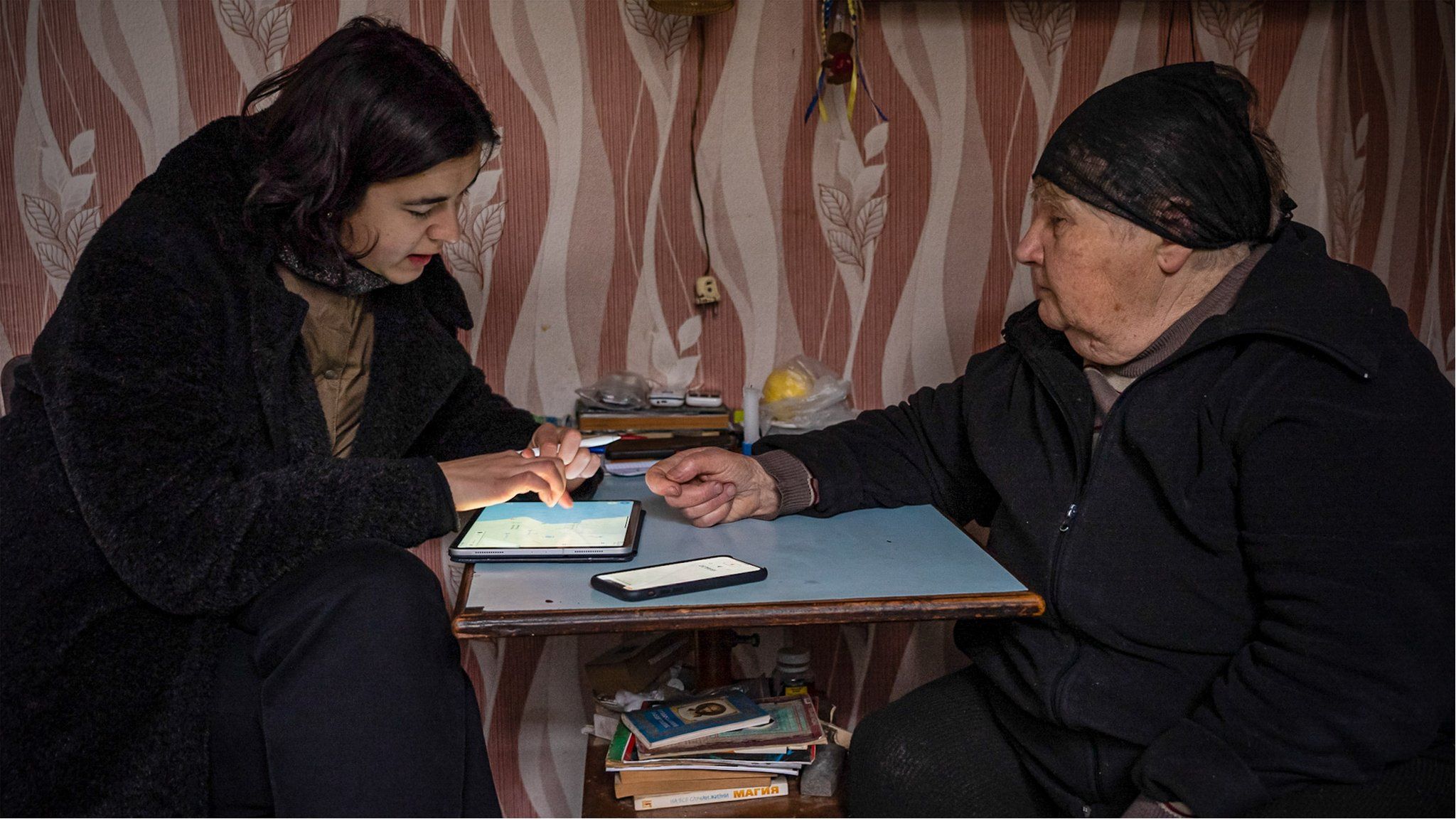
The assault heavily relied on two elements - secrecy and speed.
According to the Royal United Services Institute (RUSI) (a UK-based security think tank) by keeping plans about an attack on the capital under wraps, Russian soldiers could outnumber the Ukrainian forces by 12 to one in the north of Kyiv.
However, Putin's secrecy came at a cost. So successful was his deception, even most of his commanders did not receive their orders until 24 hours before the invasion.
On a tactical level, this left them vulnerable. They lacked food, fuel and maps. They were without proper communication tools. They had insufficient ammunition. They were even ill-prepared for the winter weather.
Kitted out with the wrong tyres and surrounded by snow, the Russians drove straight into a mud bath. Civilians close to Ivankiv describe Russian soldiers telling Ukrainian farmers to help pull their tanks out of the sludge.
Unable to progress, the Russian vehicles needed to divert to paved roads in order to avoid soft ground, forcing thousands to group into a single column.
But with limited communication between the battalions, they almost immediately converged into one almighty traffic jam.
As one military expert on the ground put it: "You don't ever travel into hostile territory in a long convoy. Ever."
Based on witness testimony and intelligence from the Ukrainian military, we were able to map the ground the convoy covered in the time between the outbreak of war and the end of March. By avoiding travelling across fields, vehicles ended up on most of the main roads north of Kyiv.
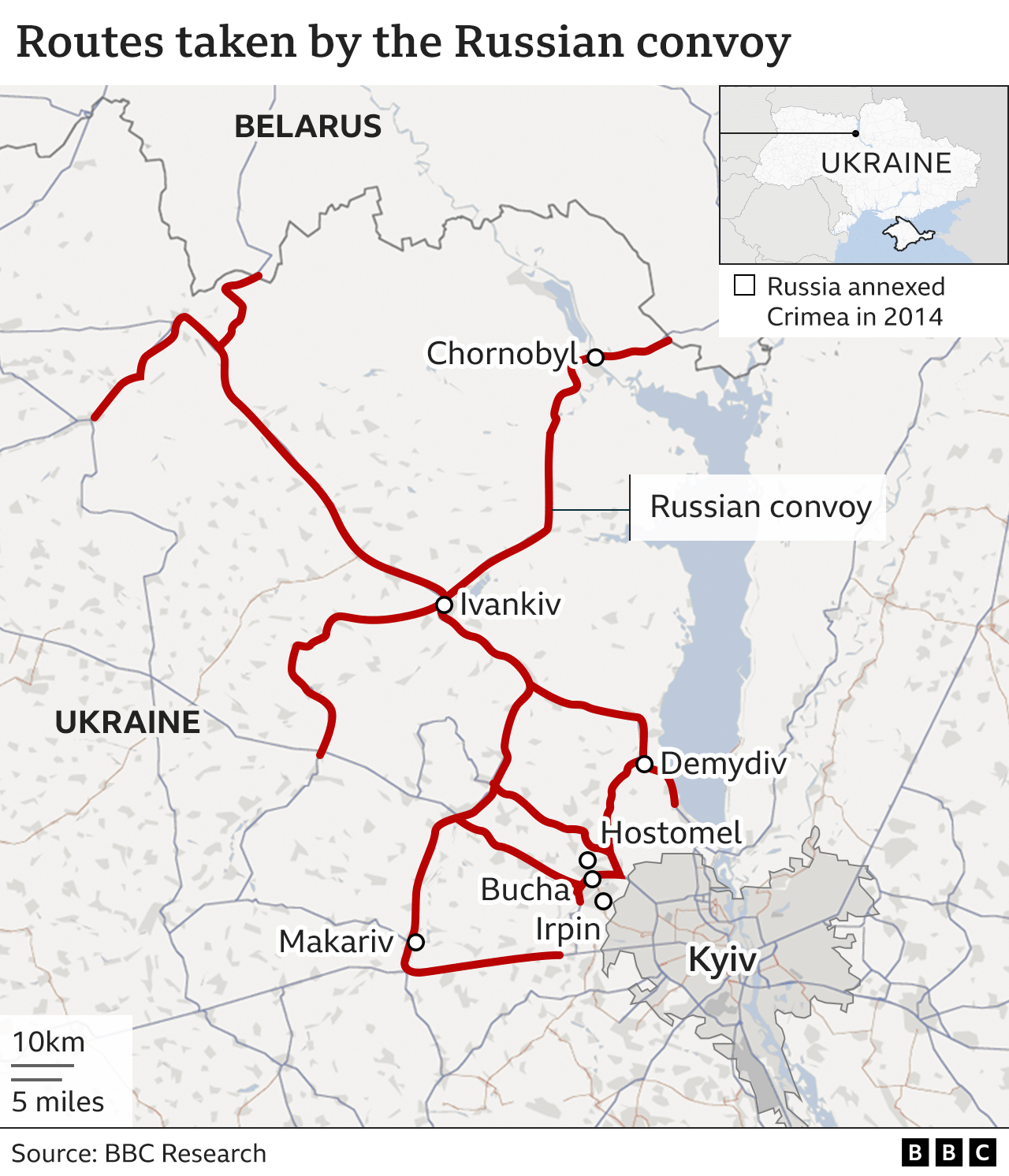
By the time the column had grown as long as 35 miles (56 km) it included up to 1,000 tanks, 2,400 mechanised infantry vehicles and 10,000 personnel, as well as dozens of supply trucks carrying food, fuel, oil and ammunition.
Stalled north of Kyiv and running out of food and fuel, the Russians had also underestimated their adversary.
A united resistance
For three days Volodymyr Scherbynyn and his fellow volunteers, the majority of them pensioners, had been preparing for the arrival of the convoy in their hometown of Bucha.
Armed with one machine gun between the 12 of them, they took down all the road signs, built checkpoints, and prepared hundreds of petrol bombs.
Until finally, on Sunday morning the Russian tanks rolled into town.
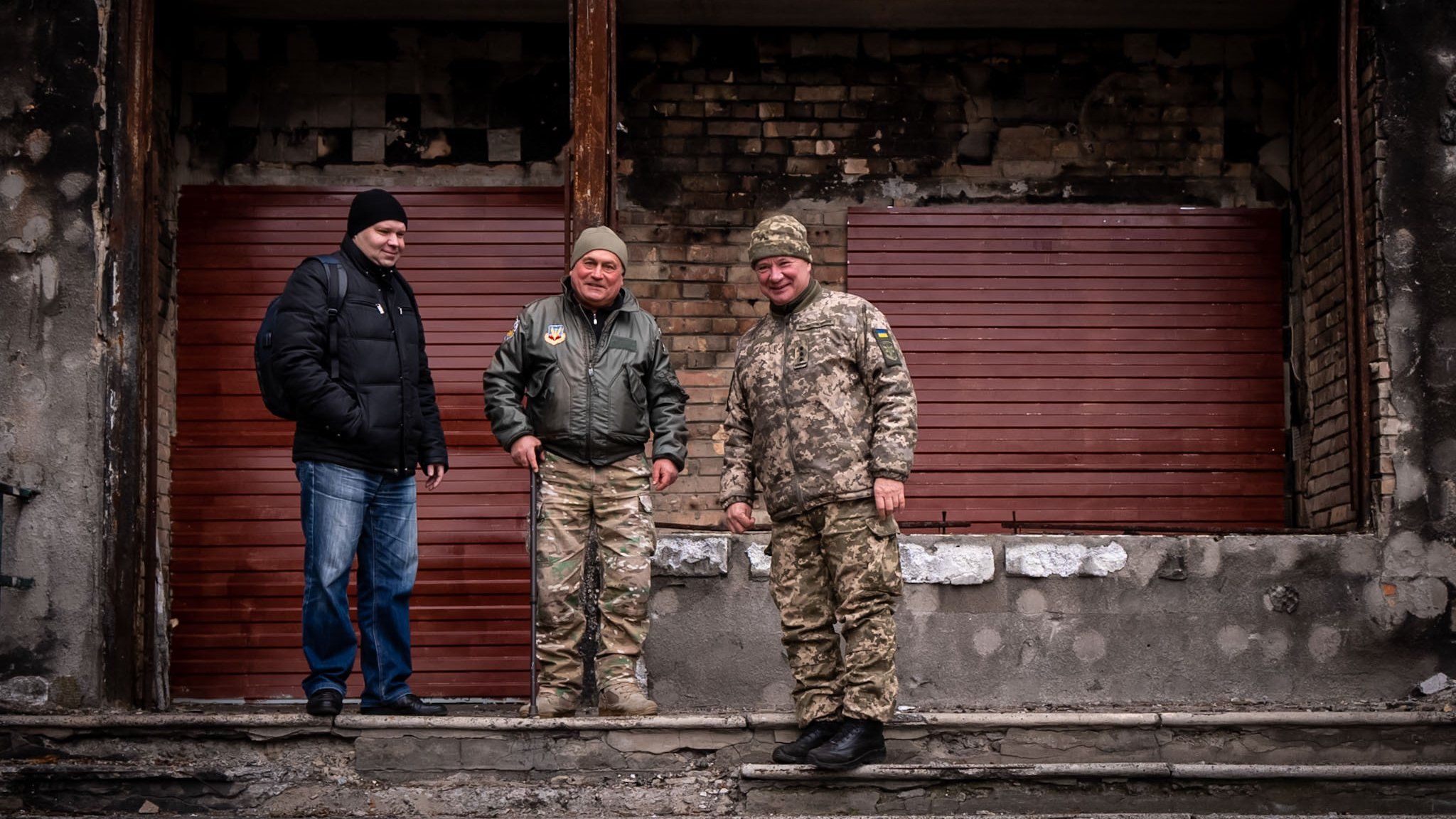
For nearly 30 minutes, Volodymyr and his grassroots unit battered the tanks with what little they had.
"We set two of the vehicles on fire and slowed down the whole convoy," says Volodymyr.
But then came the retaliation.
"When they saw us throwing bottles they opened fire," says 30-year-old Maksym Shkoropar. "I was a barman. I didn't have any military training."
By the end of that half hour, every one of Volodymyr's party had been shot and evacuated to hospital.
But even from the sick bay, Volodymyr kept on fighting - receiving and cross-checking sightings of the convoy from civilians all over the Kyiv region and calling them in to the Ukrainian authorities.
On the other end of the line was 23-year-old local deputy governor for Irpin, Roman Pohorily.
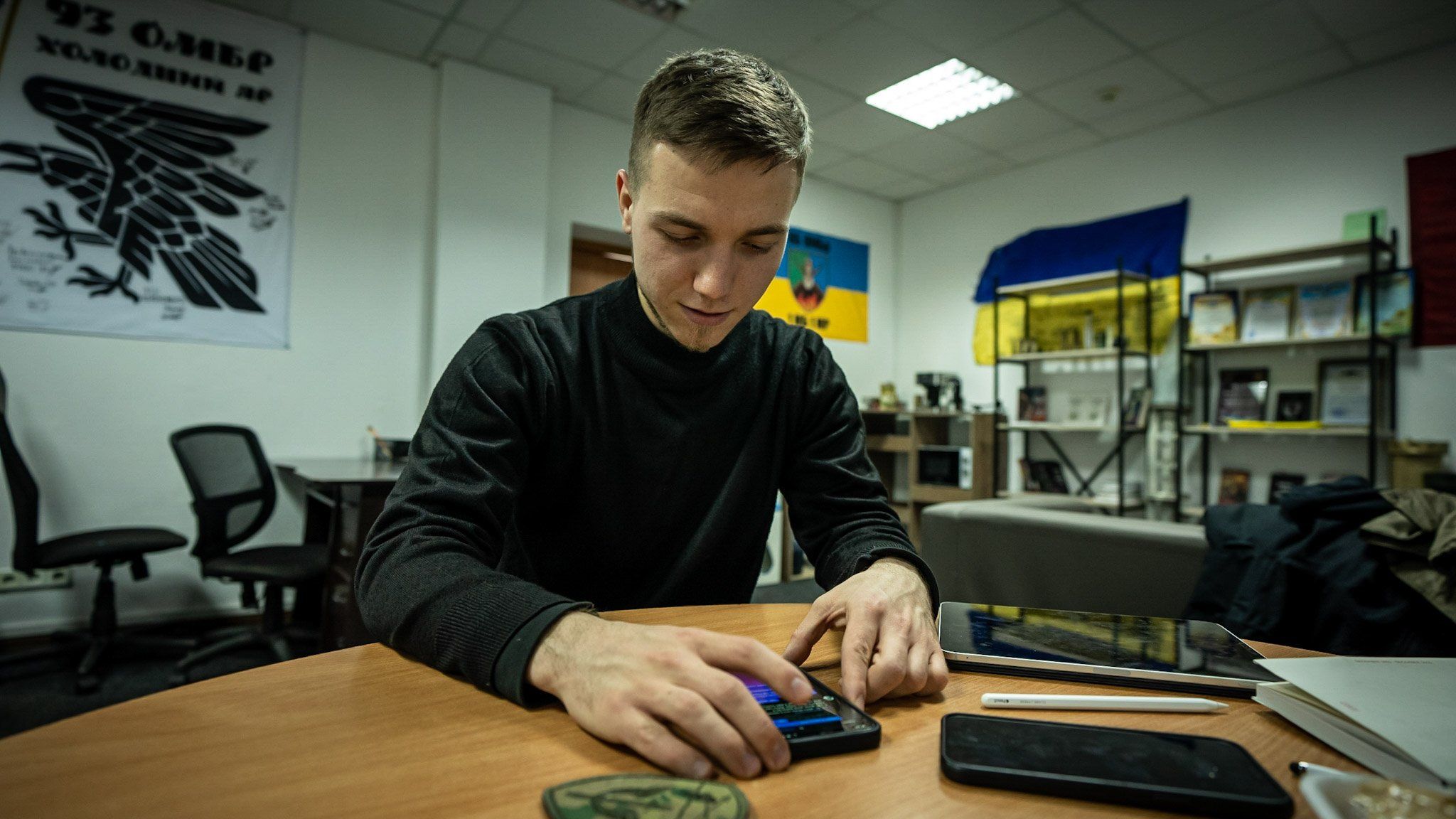
He tells the BBC he didn't sleep for three days.
"My colleague and I were manning the hotline at the council office, taking calls about the column, as well as saboteurs - people who were painting marks on the ground for the convoy to follow."
A councillor by day, Roman is also an open source intelligence expert by night. Co-founder of the highly regarded website DeepState, he pools together social media and intelligence reports. He geolocates them, then reposts them on his website.
"On their way to Kyiv, the Russians were posting videos on social media. We reposted the videos to expose their movements. They were just showing off, but in doing so, they got busted."
Most important during the assault on Kyiv, says Roman, was the sense of a united Ukraine.
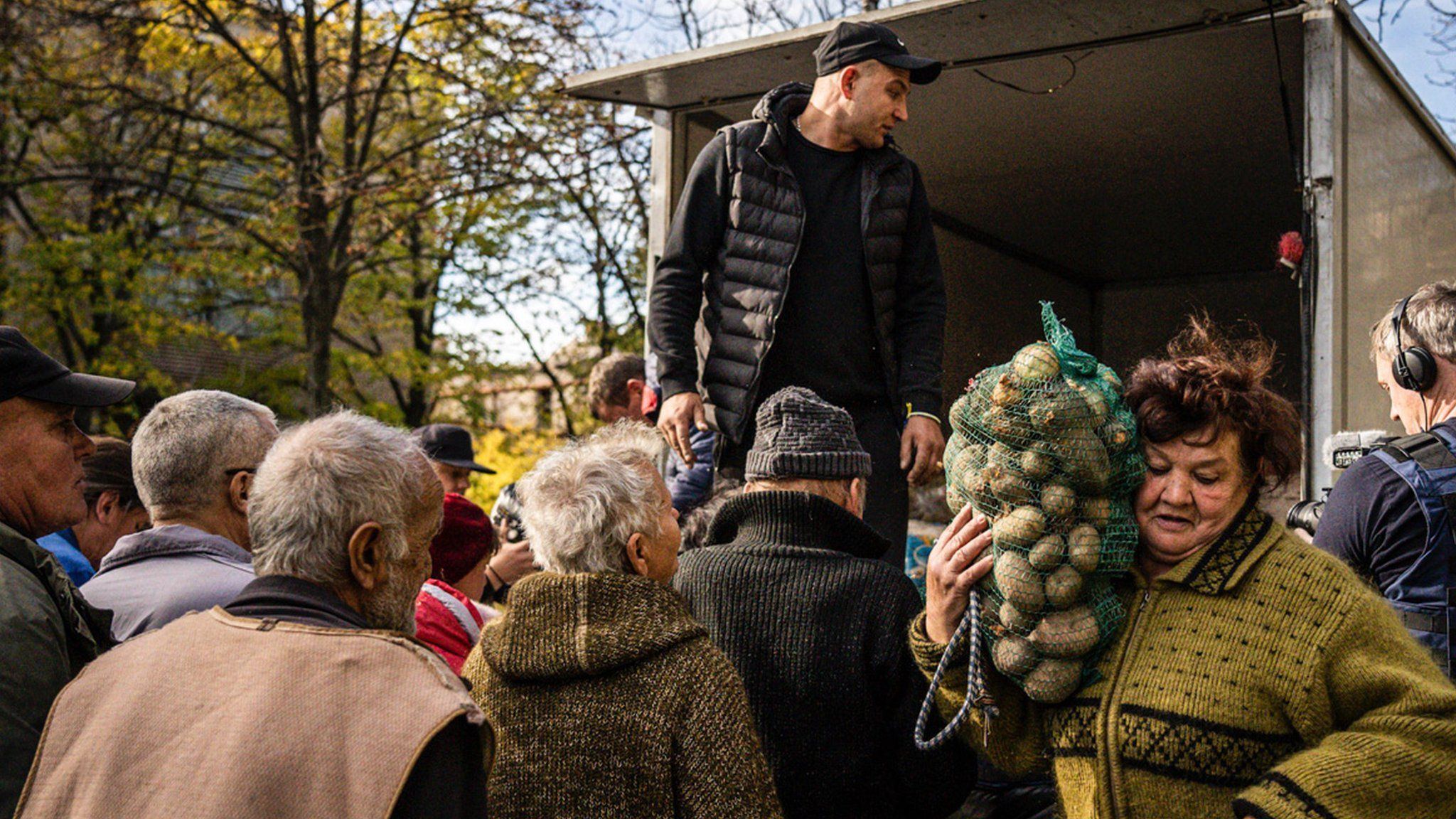
"Everyone was doing something. I admit it was very hectic in those first few days. But there were veterans helping civilians. Everyone wanted to defend their city."
In towns and villages all across the region, hundreds of attacks took place against the convoy, from civilians armed with homemade weapons to mechanised infantry and artillery.
Outdated tactics
In stark contrast to the Ukrainians, the Russian forces repeatedly exposed their inability to make dynamic decisions on the ground.
"The Russians were all carrying large metal boxes marked 'secret'," says Vladyslav from the 80th Brigade. "We seized one during an ambush. We found their maps marked with their entire route. After that we knew their whole strategy."
Their navigation tools were also woefully out of date. In the year since the invasion, the BBC has continued to find maps left behind by Russian troops that date back to the 1960s and 70s. Whole towns exist now that were not on the maps that they were using to navigate. We also found semaphore flags, a vastly outdated way to communicate between units.
One successful tactic by the Ukrainian resistance was to blow up bridges and dams ahead of the convoy, thus forcing the Russians to reroute. Reliant on old maps and with limited communications back to their high command, the Russian units frequently became paralysed by indecision.
Several satellite images show the Russian vehicles literally driving round and around in circles.
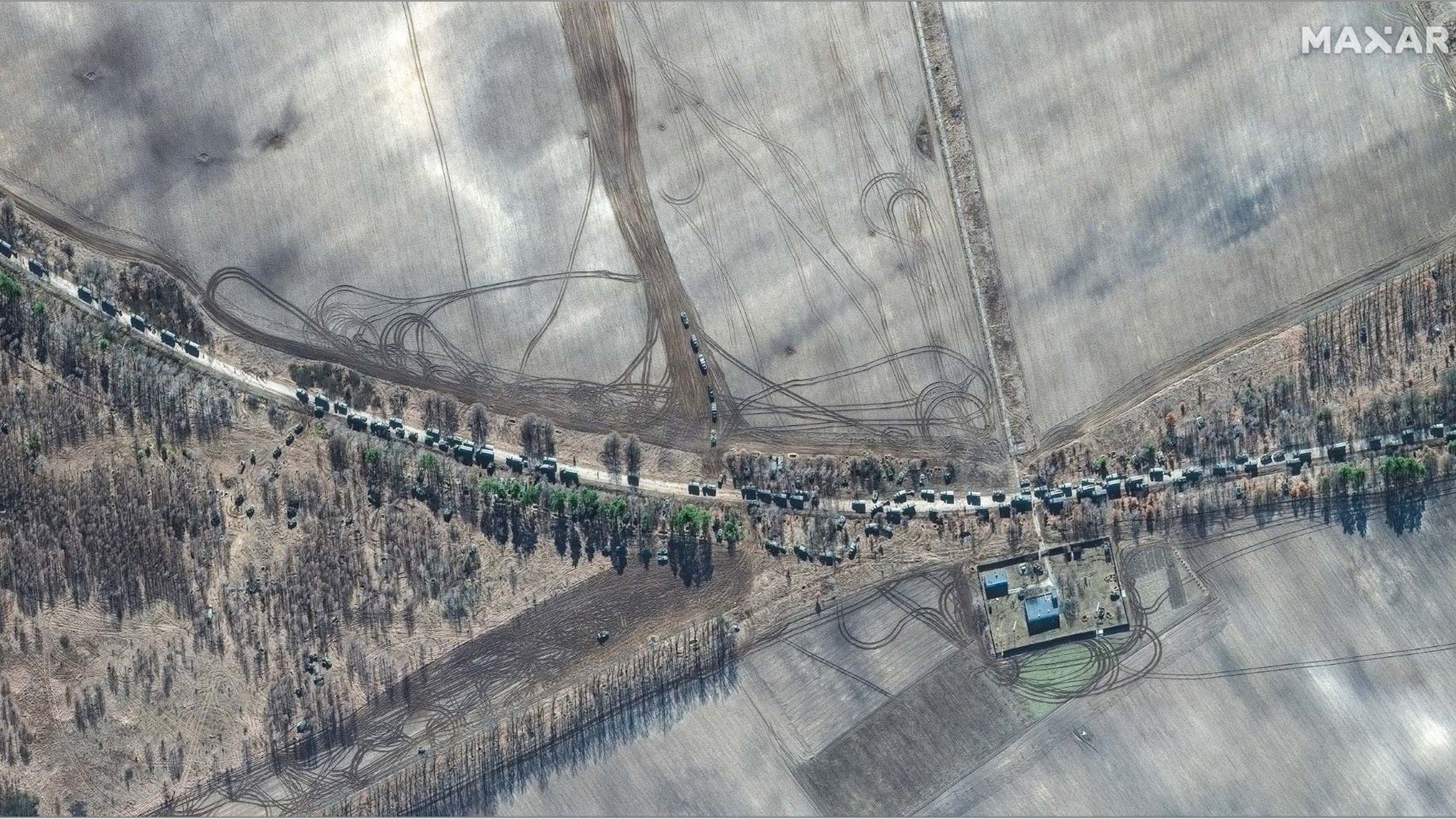
Occupation
Under pressure from Ukrainian air strikes and artillery, the Russian convoy was finally brought to a standstill just outside of Kyiv's city boundary. For thousands of civilians living close to the stalled troops, the experience was horrendous.
"They robbed everything from everywhere. They emptied the shops," says Vladyslav. "They also used civilians as human shields."
What happened in many villages and towns to the north and west of Kyiv is still being investigated by numerous authorities, including the International Criminal Court.
After four long weeks the Russians finally started to withdraw.
Two of the largest remaining battalions were defeated close to Hostomel airport. Another 370 tented army trucks, seemingly abandoned in Zdvizhivka village, were destroyed by artillery.
The Ukrainian military kept on pushing them back until 19 March, after which the Russians began to retreat from Kyiv Oblast.
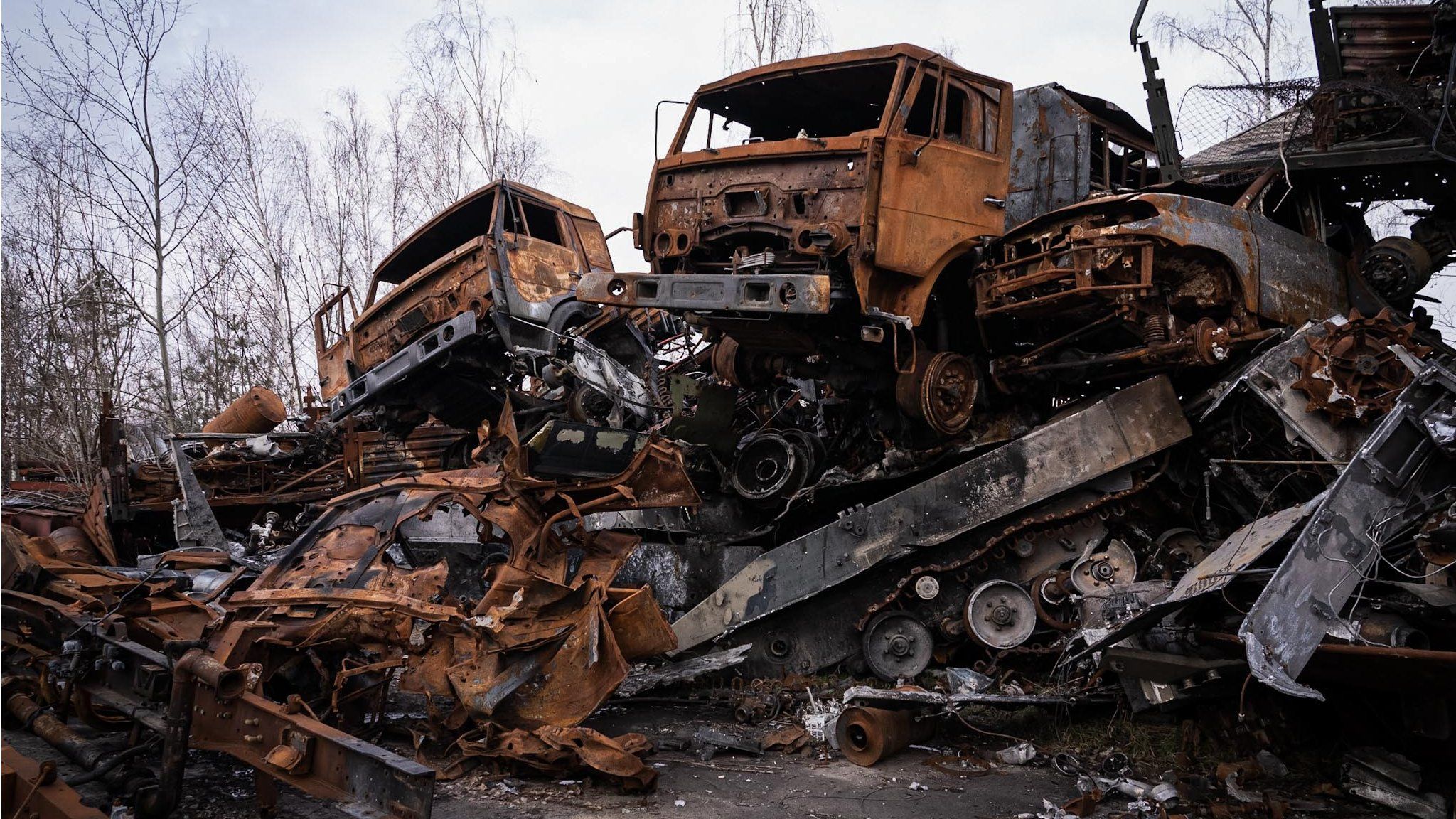
Russia is continuing to push into the eastern industrial heartland of Donbas, and strike in the south, in the direction of the Kherson and Zaporizhzhia regions.
Despite the speculation of a renewed attack on Kyiv, the majority of experts agree it would be unlikely as we have not seen a large-scale deployment of Russian troops to the Belarus border.
But still watching via reconnaissance drones close to the border, are the Ukrainian recruits.
"I'll always remember that night in Chernobyl," says Vladyslav. "When I went out to smoke with my friend. But by the time I'd finished my cigarette the war had started.
"My friend and I have this dream, that we will go on shift, just like we did that day, and as we smoke another cigarette we will hear that the war has ended. And that we won."
Special thanks to Slava Shramovych, Marcus Buckley, Michael Whelan, Alastair Thompson, Ben Allen and Tim Coey.







